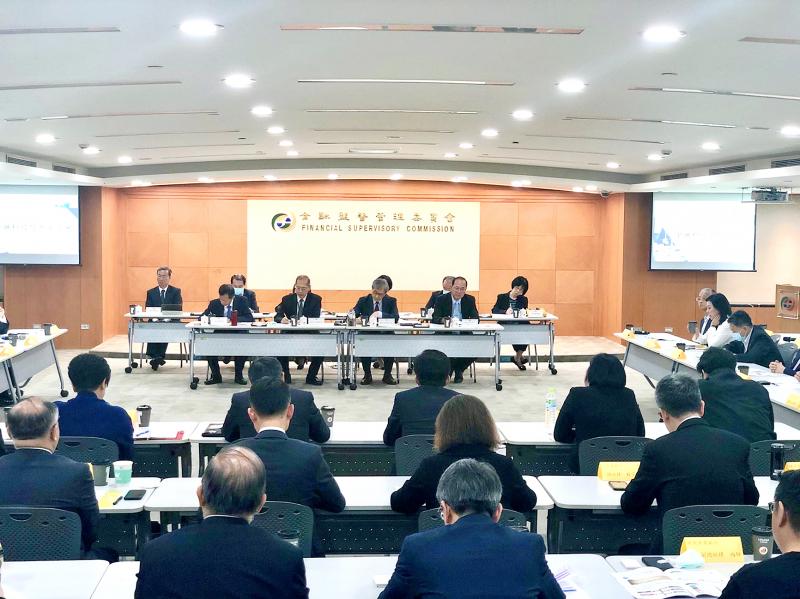Local financial firms yesterday called on the Financial Supervisory Commission to deregulate rules on consumer identity authentication, know-your-customer (KYC) data sharing and financial technology sandbox trials, saying that it would help boost their business development in Taiwan.
At a meeting organized by commission Chairman Thomas Huang (黃天牧) in New Taipei City, four local banks, Yuanta Securities Investment Trust Co (元大投信) and the Chinese National Futures Association (CNFA, 期貨公會) urged the commission to let firms adopt a more effective method of verifying consumers’ identities than using Citizen Digital Certificates.
As it is not convenient for people to have a card reader for the Citizen Digital Certificate, the government could consider allowing banks to use one-time passwords for clients’ online transactions, DBS Bank Taiwan (星展台灣) general manager Lim Him-chuan (林鑫川) said.

Photo: Kelson Wang, Taipei Times
Web-only bank Line Bank Ltd (連線商業銀行) general manager Morris Huang (黃以孟) followed up by saying that virtual banks concentrate on mobile services, but mobile devices cannot read plastic cards.
Representatives from another Web-only bank, Next Bank (將來銀行), and Yuanta Securities Investment urged the regulator to let companies cooperate with electronic payment companies with regards to identity authentication, as e-payment firms such as Jkos Pay (街口支付) conduct solid authentication.
“It is impossible to have a method of identity authentication that prevents fraud entirely,” CNFA chairman Falco Mi (糜以雍) said, adding that some fraud rings have allegedly used fake photographs, which confuse inspectors.
“The commission should let companies decide which method to use to ward off fraudsters. Companies that face higher risks would naturally adopt a more severe approach,” Mi said.
Representatives from EasyCard Corp (悠遊卡), E.Sun Commercial Bank (玉山銀行), Yuanta Financial Holding Co (元大金控) and Capital Securities Corp (群益金鼎證券) also urged the regulator to let them share KYC data to save time and money, or to establish a consumer data platform where companies could access and conduct KYC checks.
“More clients are applying to open accounts online amid the coronavirus outbreak, but when clients come from nowhere but the Internet, we cannot really figure out who they are, and it takes a much longer time conducting KYC [checks] than at our physical units,” Capital Securities president Alex Chia (賈中道) said.
“KYC is similar to the infrastructure of the business, and companies should work together. It is important for us to figure out how to share KYC data without breaching personal information protections,” Yuanta Financial chief digital development officer Kuo Mei-ling (郭美伶) said.
Regarding sandbox experiments conducted together by financial firms and non-financial companies, financial firms must take full responsibility if there are accidents or fraud under the current regulations, which has prevented many firms from getting involved, CTBC Financial president Daniel Wu (吳一揆) said.
To keep in line with its peers in Japan and South Korea, the commission could divide the non-financial firms into groups of different business scales, and large non-financial firms should take some responsibility, too, Wu said.
Shin Kong Life Insurance Co (新光人壽) vice chairwoman Catherine Lee (李紀珠) said that the commission should assign a third-party agency to helping insurers exchange their data with medical institutions, which would make insurance claims more convenient for clients.
It would encourage clients to choose medical insurance policies or other protection-type products, Lee said.

In Italy’s storied gold-making hubs, jewelers are reworking their designs to trim gold content as they race to blunt the effect of record prices and appeal to shoppers watching their budgets. Gold prices hit a record high on Thursday, surging near US$5,600 an ounce, more than double a year ago as geopolitical concerns and jitters over trade pushed investors toward the safe-haven asset. The rally is putting undue pressure on small artisans as they face mounting demands from customers, including international brands, to produce cheaper items, from signature pieces to wedding rings, according to interviews with four independent jewelers in Italy’s main

Japanese Prime Minister Sanae Takaichi has talked up the benefits of a weaker yen in a campaign speech, adopting a tone at odds with her finance ministry, which has refused to rule out any options to counter excessive foreign exchange volatility. Takaichi later softened her stance, saying she did not have a preference for the yen’s direction. “People say the weak yen is bad right now, but for export industries, it’s a major opportunity,” Takaichi said on Saturday at a rally for Liberal Democratic Party candidate Daishiro Yamagiwa in Kanagawa Prefecture ahead of a snap election on Sunday. “Whether it’s selling food or

CONCERNS: Tech companies investing in AI businesses that purchase their products have raised questions among investors that they are artificially propping up demand Nvidia Corp chief executive officer Jensen Huang (黃仁勳) on Saturday said that the company would be participating in OpenAI’s latest funding round, describing it as potentially “the largest investment we’ve ever made.” “We will invest a great deal of money,” Huang told reporters while visiting Taipei. “I believe in OpenAI. The work that they do is incredible. They’re one of the most consequential companies of our time.” Huang did not say exactly how much Nvidia might contribute, but described the investment as “huge.” “Let Sam announce how much he’s going to raise — it’s for him to decide,” Huang said, referring to OpenAI

The global server market is expected to grow 12.8 percent annually this year, with artificial intelligence (AI) servers projected to account for 16.5 percent, driven by continued investment in AI infrastructure by major cloud service providers (CSPs), market researcher TrendForce Corp (集邦科技) said yesterday. Global AI server shipments this year are expected to increase 28 percent year-on-year to more than 2.7 million units, driven by sustained demand from CSPs and government sovereign cloud projects, TrendForce analyst Frank Kung (龔明德) told the Taipei Times. Demand for GPU-based AI servers, including Nvidia Corp’s GB and Vera Rubin rack systems, is expected to remain high,